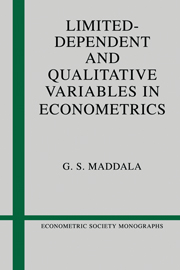Book contents
- Frontmatter
- Contents
- Preface
- Dedication
- Chapter 1 Introduction
- Chapter 2 Discrete regression models
- Chapter 3 Probabilistic-choice models
- Chapter 4 Discriminant analysis
- Chapter 5 Multivariate qualitative variables
- Chapter 6 Censored and truncated regression models
- Chapter 7 Simultaneous-equations models with truncated and censored variables
- Chapter 8 Two-stage estimation methods
- Chapter 9 Models with self-selectivity
- Chapter 10 Disequilibrium models
- Chapter 11 Some applications: unions and wages
- Appendix: Some results on truncated distributions
- Bibliography
- Index
Chapter 3 - Probabilistic-choice models
Published online by Cambridge University Press: 05 January 2013
- Frontmatter
- Contents
- Preface
- Dedication
- Chapter 1 Introduction
- Chapter 2 Discrete regression models
- Chapter 3 Probabilistic-choice models
- Chapter 4 Discriminant analysis
- Chapter 5 Multivariate qualitative variables
- Chapter 6 Censored and truncated regression models
- Chapter 7 Simultaneous-equations models with truncated and censored variables
- Chapter 8 Two-stage estimation methods
- Chapter 9 Models with self-selectivity
- Chapter 10 Disequilibrium models
- Chapter 11 Some applications: unions and wages
- Appendix: Some results on truncated distributions
- Bibliography
- Index
Summary
This chapter continues with the multinomial logit model discussed in section 2.12. It derives the multinomial logit model from a theory of probabilistic choice. We then discuss its limitations and examine some extensions of this model (the multinomial probit model, the nested logit model, the generalized extreme-value model, etc.).
McFadden's conditional logit model
In the previous chapter we discussed the multinomial logit model as an extension of the simple logit model for dichotomous variables. There it was pointed out that there is a difference in the way the multinomial logit model was derived and discussed in some of the statistical literature and the way it was discussed by McFadden. The latter discussion is related to the hedonic-price problem in econometrics and the theory of probabilistic choice discussed by several psychologists. In this chapter we shall discuss the multinomial logit model and its extensions as developed by McFadden (1973, 1974, 1976a, 1978, 1979, 1982, in press).
We start with the assumption that consumers are rational in the sense that they make choices that maximize their perceived utility subject to constraints on expenditures. However, there are many errors in this maximization because of imperfect perception and optimization, as well as the inability of the analyst to measure exactly all the relevant variables. Hence, following Thurstone (1927), McFadden assumed that utility is a random function.
- Type
- Chapter
- Information
- Publisher: Cambridge University PressPrint publication year: 1983
- 1
- Cited by



